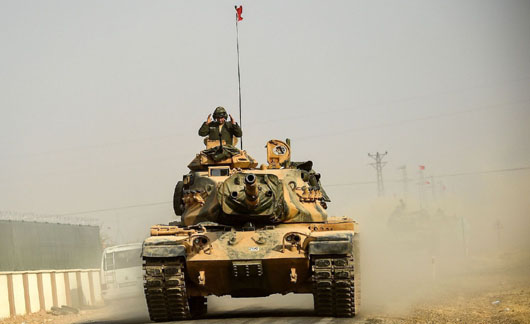CELEBRATING 20 YEARS OF EXCELLENCE: Countdown: Top stories of 2018
Turkey sent military reinforcements into Syria on Dec. 22 days after U.S. President Donald Trump said he would withdraw the roughly 2,000 U.S. troops stationed in Syria.

“Around 35 tanks and other heavy weapons, carried aboard tank carriers, crossed the Jarablos border crossing in the early evening,” Rami Abdel Rahman, the head of the Britain-based Syrian Observatory for Human Rights, told AFP.
“They headed for an area near the Sajour River, between Jarablos and Manbij, not far from the front lines where Kurdish fighters of the Manbij Military Council are stationed,” he added.
Earlier this month, Turkish President Recep Tayyip Erdogan announced that Turkey would launch an operation against the Syrian Democratic Forces (SDF), a U.S.-backed Kurdish force in northern Syria.
“We have made our warnings and completed our preparations,” Erdogan said.
Trump agreed to the withdrawal during a Dec. 14 phone call with Erdogan, two officials told NBC News, but the original purpose of the call had been “for Trump to tell Erdogan to back off” threats to attack the SDF, NBC reported.
But Trump went off-script during the call and agreed with Erdogan, particularly when the Turkish president asked Trump, “Why are you still there?” when the Islamic State (ISIS) had been 99 percent defeated. Erdogan reportedly told Trump that Turkey could handle what was left.
The phone conversation prompted U.S. national security adviser John Bolton “to admit” Erdogan’s point. NBC News reported: “With Erdogan on the line, Trump asked national security adviser John Bolton, who was listening in, why American troops remained in Syria if what the Turkish president was saying was true, according to the officials. Erdogan’s point, Bolton was forced to admit, had been backed up by (Defense Secretary Jim) Mattis, (Secretary of State Mike) Pompeo, U.S. special envoy for Syria Jim Jeffrey and special envoy for the anti-ISIS coalition Brett McGurk, who have said that IS retains only 1 percent of its territory, the officials said.”
The Daily Caller noted that Trump’s decision to withdraw U.S. forces from Syria and Afghanistan “has been roundly criticized by neoconservative politicians, military brass, and even Democrats normally opposed to war but eager to find a point with which to hammer the president. However, it does represent Trump’s desire to keep a key campaign promise, and has not been without its defenders, including Kentucky Senator Rand Paul.
White House senior policy adviser Stephen Miller summed up the president’s view during a Dec. 20 appearance with CNN’s Wolf Blitzer.
“This president got elected to get our foreign policy back on the right track after years of being adrift,” Miller said. “One foreign policy blunder after another in Iraq and Afghanistan and Libya hasn’t worked out for our national interest.”
“And let’s talk about Syria,” he added. “Let’s talk about the fact – ISIS is the enemy of Russia. ISIS is the enemy of Assad. ISIS is the enemy of Turkey. Are we supposed to stay in Syria for generation after generation, spilling American blood to fight the enemies of all those countries? Wolf, when did the American people sign up to be in every war in every place in every side of every conflict all over planet earth?”
Check Out Geostrategy-Direct __________ Jump Start the U.S. Media
